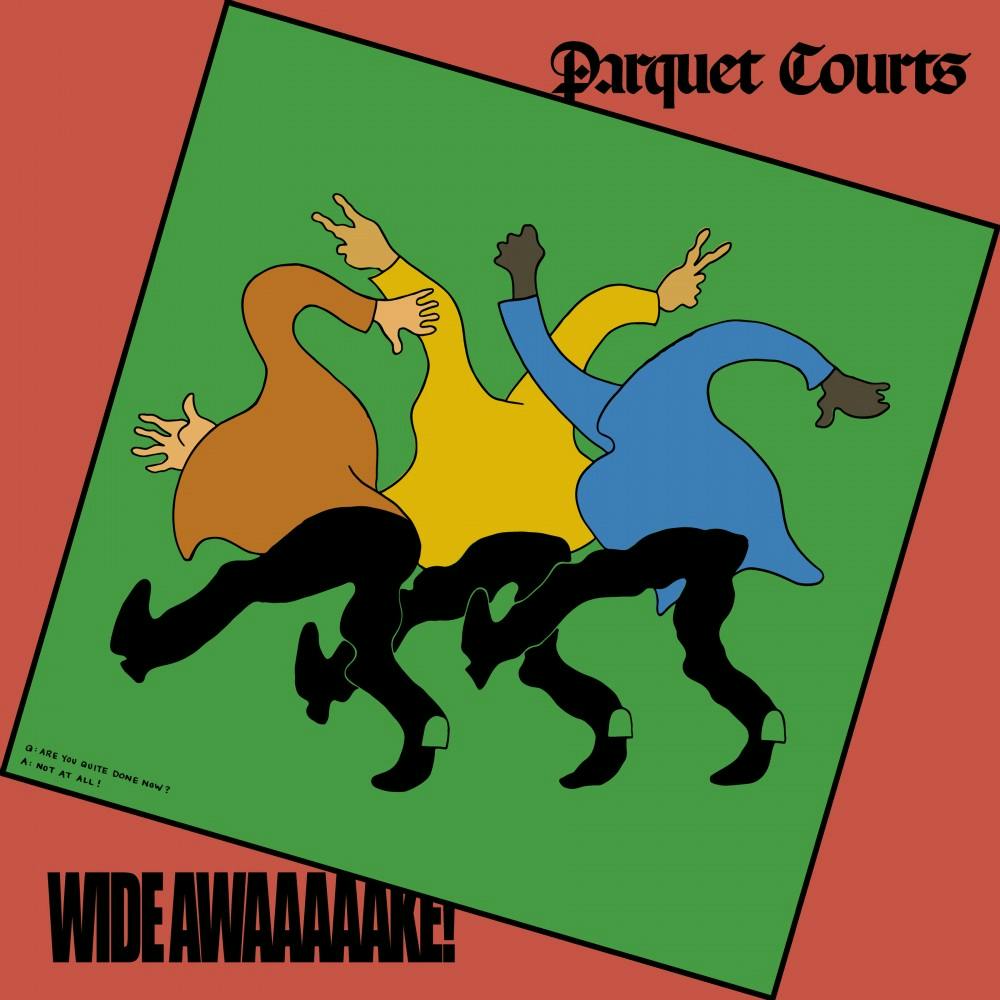I had a history teacher once who included music and art in his lesson plans as a way of demonstrating the relationship between political and cultural climates. The more I understood these connections, the more I started to recognize similar ways in which today’s politics infiltrate music; yet, rarely did I see it in rock, and even more rarely did it come from all–white male bands. Parquet Courts changed that with their new album, Wide Awake!.
Full of symbolism and allusions, the opening track “Total Football” references a Dutch football tactic in which any outfield player can take over the role of another, creating a fluid and cohesive organization. The song’s message of prioritizing collective progress over self–interest is obvious as lead singer A. Savage screams, “Collectivism and autonomy are not mutually exclusive,” over the driving beat of a protest song.
But, if the first song is an excited galvanization for social action, songs like “Violence” and “Before the Water Gets Too High” review why such action is necessary. In “Violence,” an extra focus on the bass line brings a darker mood as Savage shout–sings about the normalization of violence through discussions of closed caskets, gentrification, and even a reflection on the meaning of his own last name. He makes no attempt to mince words, and his disturbing honesty in this song brings forth a power that the band sustains for the rest of the album.
This same power is what gives a haunting tragedy to “Death Will Bring Change.” Though more vague in lyrical description, the innocent children’s chorus that sings the dark titular line calls forth images of recent school shootings, already giving the song more context than the band could’ve foreseen in the album’s production.
And again, Savage extends the normalization of violence in our lives to even the most mundane activities in “Extinction,” narrowing the gap in human–to–human connection that TV and phone screens create. In talking about choosing between steamed or fried food, Savage somehow finds a way to make a connection to the “faces we wear,” ending the song with the ringing observation that “Lying to ourselves everyday becomes incredibly easy.”
But for all of this darkness, Wide Awake! resists the temptation to take on a spirit of morose defeat. Rather, we see Savage struggle against such overbearing dejection by trying to translate it into action in songs like “Almost Had to Start a Fight / In and Out of Patience,” the first single released for the album. The lyrics in the first half of the song have phrase repetitions like those in the words, “What if, what if, what if, what if / I’ve got tired of being polite?” Backed by sharp guitar chords and a kicking drum, the words pound like fists on a punching bag, heightening the frustration of the song as Savage understands the need for peaceful change, but doesn’t quite yet know how to achieve it.
Most striking though is how in touch Wide Awake! is with rock history. “NYC Observation” and “Normalization” are slightly cleaned up versions of Ramones–era CBGB punk while “Tenderness” and “Freebird II” are more classic rock in their essence, with the latter possibly referencing Lynyrd Skynyrd’s well–known anthem. Parquet Courts also reference the past popularity of the continuity of vinyl records in the album’s sequence, most notably in the flowing connection between “Almost Had to Start a Fight / In and Out of Patience” and “Freebird II.”
While there is an acknowledgment of the past, there is also a rejection of too much nostalgia for it in the opening lines of the closing track, as Savage follows a cheery piano line with, “We’ve come to replace your clock’s old stubborn hands / We are the answer to why they never had a chance.” The lack of antecedents here is purposeful, blaming old stubbornness for lack of progress, regardless of its roots. The most identifiable attitude, though, is perhaps the true claim that we are plagued by a heavy focus on superficial qualities, that was less obvious 60 years ago.
This gradual intrusion of celebrity into politics over the past few decades reached a new maximum with the last presidential election, and Parquet Courts are by no means the first to react to it. But Wide Awake! stands out by going beyond recognition of modern–day materialism and trying to somehow digest it.
Even if they aren’t fully successful in the end (the last line of the album being a somewhat vague desire for “tenderness”), the power comes not from the result, but rather from the search for it. The balance between the personal and the universal, and between frustration and depression on this album makes it an instant classic that is undoubtedly representative of the current generation. The only question that remains is whether the album will age as a 38–minute break from the numbness it speaks of, or whether it will leave us all as wide awake as Parquet Courts seems to be.
Parquet Courts plays Union Transfer on Friday, June 8. Tickets are available here.

